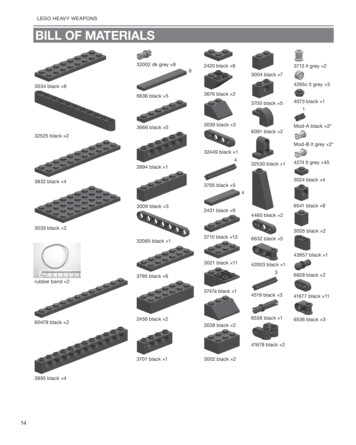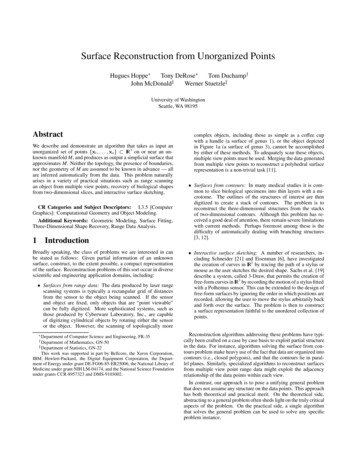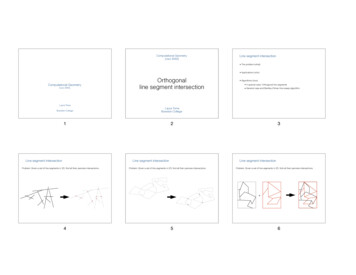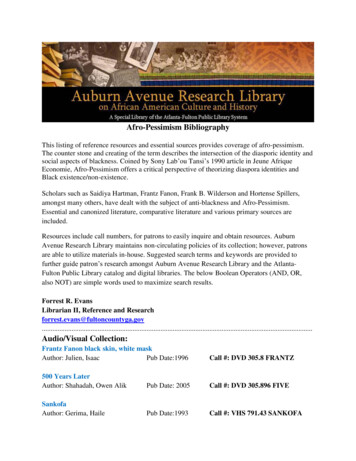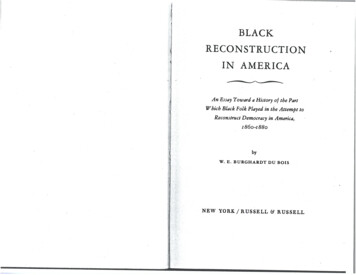
Transcription
BLACKRECONSTRUCTIONIN AMERICAAn Essay Toward a History of the PartWhich Black Folk Played in the Attempt toReconstruct Dempcracy in America,I 86o-i 88obyw.E. BURGHARDT DU BOISNEW YORK/RUSSELL & RUSSELL
SOCIALSCIENCES4275V.!?LCOPYRIGHT, 1935,REISSUED,1963,1956,BY W. E. BURGHARDT DU BOIlBY RUSSELL & RUSSELLA DIVISION OF ATHENEUM PUBLISHERS, INC.BY ARRANGEMENT WITH W. E. B. DU BOISL. C. CATALOG CARD N0.ISBN:68-12370-8462-0172-0PRINTED IN THE UNITED STATES OF AMERiCAALL RIGHTS RESERVED. NO PART OF THIS BOOK MAY BE REPRODUCEDIN ANY FORM WITHOUT PERMISSION IN WRITING FROM THE PUBLISHERS.?lEI5GatAd Virginiam Vitae Salvatorem
XVII. THE PROPAGANDA OF HISTORYHow the facts of American history have in the last half centurybeen falsified because the nation was ashamed. The South wasashamed because it fought to perpetuate human slavery. The Northwas ashamed because it had to call in the black men to save theUnion, abolish slavery and establish democracyWhat are American children taught today about Reconstruction?Helen Boardman has made a study of current textbooks and notesthese three dominant theses:I. All Negroes were ignorant.“All were ignorant of public business.” (Woodburn and Moran,“Elementary American History and Government,” p. 397.)“Although the Negroes were now free, they were also ignorant andunfit to govern themselves.” (Everett Barnes, “American History forGrammar Grades,” p. 334.)“The Negroes got control of these states. They had been slaves alltheir lives, and were so ignorant they did not even know the lettersof the alphabet. Yet they now sat in the state legislatures and madethe laws.” (D. H. Montgomery, “The Leading Facts of American History,” p. 332.)“In the South, the Negroes who had so suddenly gained their freedom did not know what to do with it.” (Hubert Cornish and ThomasHughes, “History of the United States for Schools,” p.345.)“In the legislatures, the Negroes were so ignorant thatthey couldonly watch their white leaders—carpetbaggers, and vOte aye or noas they were told.” (S. E. Forman, “Advanced American History,”Revised Edition, p. 452.)“Some legislatures were made up of a few dishonest white menSand several Negroes, many too ignorant to know anything aboutlaw-making.” (Hubert Cornish and Thomas Hughes, “History of theUnited States for Schools,” p. 349.)2. All Negroes were lazy, dishonest and extravagant.“These men knew not only nothing about the government, but alsocared for nothing except what they could gain for themselves.” (Helen.SF. Giles, “How the United States Became a World Power,” p.7.)“Legislatureswere often at the mercy of Negroes, childishly ignorant, who sold their votes openly, and whose ‘loyalty’ was gained by7”
BLACK RECONSTRUCTIONallowing them to eat, drink and clothe themselves at the state’s cxpense.” (William J. Long, “America—A History of Our Country,”712P. 392.)“Some Negroes spent their money foolishly, and were worse off thanthey had been before.” (Carl Russell Fish, “History of America,”p. 385.)“This assistance led many freed men to believe that they need nolonger work. They also ignorantly believed that the lands of theirformer masters were to be turned over by Congress to them, and thatevery Negro was to have as his allotment ‘forty acres and a mule.’”(W. F. Gordy, “History of the United States,” Part II, p. 336.)“Thinking that slavery meant toil and that freedom meant onlyidleness, the slave after he was set free was disposed to try out hisfreedom by refusing to work.” (S. E. Forman, “Advanced AmericanHistory,” Revised Edition.)“They began to wander about, stealing and plundering. In oneweek, in a Georgia town, 150 Negroes were arrested for thieving.”( Helen F. Giles, “How the United States Became a World Power,”p. 6.)3. Negroes were responsible for bad government during Reconstruction:“Foolish laws were passed by the black law-makers, the publicmoney was wasted terribly and thousands of dollars were stolenstraight. Self-respecting Southerners chafed under the horrible régime.”(Emerson David Fite, “These United States,” p. 37.)“In the exhausted states already amply ‘punished’ by the desolationof war, the rule of the Negro and his unscrupulous carpetbagger andscalawag patrons, was an orgy of extravagance, fraud and disgustingincompetency.” (David Saville Muzzey, “History of the AmericanPeople,” p. 408.)“The picture of Reconstruction which the average pupil in thesesixteen States receives is limited to the South. The South found itnecessary to pass Black Codes for the control of the shiftless and sometimes vicious freedmen. The Freedmen’s Bureau caused the Negroesto look to the North rather than to the South for support and bygiving them a false sense of equality did more harm than good. Withthe scalawags, the ignorant and non-propertyholding Negroes underthe leadership of the carpetbaggers, engaged in a wild orgy of spending in the legislatures. The humiliation and distress of the Southernwhites was in part relieved by the Ku Klux Klan, a secret organization which frightened the superstitious blacks.”’Grounded in such elementary and high school teaching, an Amencan youth attending college today would learn from current textbooks.THE PROPAGANDA OF HISTORY713of history that the Constitution recognized slavery; that the chanceof getting rid of slavery by peaceful methods was ruined by theAbolitionists; that after the period of Andrew Jackson, the two sections of the United States “had become fully conscious of their conflicting interests. Two irreconcilable forms of civilizationin theNorth, the democraticin the South, a more stationary and aristocratic civilization.” He would Eead that Harriet Beecher Stowebrought on the Civil War; that the assault on Charles Sumner wasdue to his “coarse invective” against a South Carolina Senator; andthat Negroes were the only people to achieve emancipation with noeffort on their part. That Reconstruction was a disgraceful attempt tosubject white people to ignorant Negro rule; and that, according to aHarvard professor of history (the italics are ours), “Legislative cxpenses were grotesquely extravagant; the colored members in somestates engaging in a saturnalia of corrupt expenditure” (EncyclopaediaBritannica, ith Edition, Volume 22, p. 815, by Frederick Jackson4Turner).In other words, he would in all probability complete his educationwithout any idea of the part which the black race has played inAmerica; of the tremendous moral problem of abolition; of the causeand meaning of the Civil War and the relation which Reconstructionhad to democratic government and the labor movement today.Herein lies more than mere omission and difference of emphasis.The treatment of the period of Reconstruction reflects small creditupon American historians as scientists. We have too often a deliberateattempt so to change the facts of history that the story will makepleasant reading for Americans. The editors of the fourteenth editionof the Encyclopaedia Britannica asked me for an article on the historyof the American Negro. From my manuscript they cut out all myreferences to Reconstruction. I insisted on including the followingstatement:“Whitehistorians have ascribed the faults and failures of Reconstruction to Negro ignorance and corruption. But the Negro insiststhat it was Negro loyalty and the Negro vote alone that restored theSouth to the Union; established the new democracy, both for whiteand black, and instituted the public schools.”This the editor refused to print, although he said that the articleotherwise was “in my judgment, and in the judgment of others inthe office, an excellent one, and one with which it seems to me wemay all be well satisfied.” I was not satisfied and refused to allow thearticle to appear.War and especially civil strife leave terrible wounds. It is the dutyof humanity to heal them. It was therefore soon conceived as neither.4I‘.i.:II4.-. .:,.-.
714BLACK RECONSTRUCTIONwise nor patriotic to speak of all the causes of strife and the terribleresults to which sectional differences in the United States had led.And so, first of all, we minimized the slavery controversy which convulsed the nation from the Missouri Compromise down to the CivilWar. On top of that, we passed by Reconstruction with a phrase ofregret or disgust.But are these reasons of courtesy and philanthropy sufficient fordenying Truth ? If history is going to be scientific, if the record ofhuman action is going to be set down with that accuracy and faithfulness of detail which will allow its use as a measuring rod and guidepost for the future of nations, there must be set some standards ofethics in research and interpretation.If, on the other hand, we are going to use history for our pleasureand amusement, for inflating our national ego, and giving us a falsebut pleasurable sense of accomplishment, then we must give up theidea of history either as a science or as an art using the results ofscience, and admit frankly that we are using a version of historic factin order to influence and educate the new generation along the waywe wish.It is propaganda like this that has led men in the past to insist thathistory is “lies agreed upon”; and to point out the danger in suchmisinformation. It is indeed extremely doubtful if any permanentbenefit comes to the world through such action. Nations reel and stagger on their way; they make hideous mistakes; they commit frightful wrongs; they do great and beautiful things. And shall we not bestguide humanity by telling the truth about all this, so far as the truthis ascertainable ?Here in the United States we have a clear example. It was morallywrong and economically retrogressive to build human slavery in theUnited States in the eighteenth century. We know that now, perfectly well; and there were many Americans North and South whoknew this and said it in the eighteenth century. Today, in the face ofnew slavery established elsewhere in the world under other names andguises, we ought to emphasize this lesson of the past. Moreover, it isnot well to be reticent In describing that past. Our histories tend todiscuss American slavery so impartially, that in the end nobody seemsto have done wrong and everybody was right. Slavery appears to havebeen thrust upon unwilling helpless America, while the South wasblameless in becoming its center. The difference of development,North and South, is explained as a sort of working out of cosmicsocial and economic law.One reads, for instance, Charles and Mary Beard’s “Rise of Amencan Civilization,” with a comfortable feeling that nothing night orTHE PROPAGANDA OF HISTORY715wrong is involved. Manufacturing and industry develop in the North;agrarian feudalism develops in the South. They clash, as winds andwaters strive, and the stronger forces develop the tremendous industnial machine that governs us so magnificently and selfishly today.Yet in this sweeping mechanistic interpretation, there is no roomfor the real plot of the story, for the clear mistake and guilt of rebuilding a new slavery of the working dassin the midst of a fatefulexperiment in democracy; for the triumph of sheer moral courageand sacnifice in the abolition crusade; and for the hurt and struggleof degraded black millions in their fight for freedom and their attemptto enter democracy. Canall this be omitted or half suppressed in atreatise that calls itself scientific?Or, to come nearer the center and climax of this fascinating history:What was slavery in the United States ? Just what did it mean to theowner and the owned ? Shall we accept the conventional story of theoldslave plantation and its owner’s fine, aristocratic life of culturedleisure ? Or shall we note slave biographies, like those of Charles Ball,Sojourner Truth, Harriet Tubman and Frederick Douglass; the careful observations of Olmsted and the indictment ofHinton Helper?No one can read that first thin autobiography of Frederick Douglassand have left many illusions about slavery. And if truth is our object,no amount of flowery romance and the personal reminiscences of itsprotected beneficiaries can keep the world from knowing that slaverywas a cruel, dirty, costly and inexcusable anachronism, which nearlyruined the world’s greatest experiment in democracy. No serious andunbiased student can be deceived by the fairy tale of a beautifulSouthern slave civilization. If those who really had opportunity toknow the South before the war wrote the truth, it was a center ofwidespread ignorance, undeveloped resources, suppressed humanityand unrestrained passions, with whatever veneer of manners and culture that could lie above these depths.Coming now to the Civil War, how for a moment can anyone whoreads the CQngrcssional Globe from 1850 to i86o, the lives of contemporary statesmen and public characters, North and South, the discourses in the newspapers and accounts of meetings and speeches,doubt that Negro slavery was the cause of the Civil War ? What dowe gain by evading this clear fact, and talking in vague ways about“Union” and “State Rights” and differences in civilization as thecause of that catastrophe?Of all historic facts there can be none clearer than that for fourlong and fearful years the South fought to perpetuate human slavery;and that the nation which “rose so bright and fair and died so pureof stain” was one that had a perfect right to be ashamed of its birth.I
BLACK RECONSTRUCTION716and glad of its death. Yet one monument in North Carolina achievesthe impossible by recording of Confederate soldiers : “They died fighting for liberty!”On the other hand, consider the North and the Civil War. Whyshould we be deliberately false, like Woodward, in “Meet GeneralGrant,” and represent the North as magnanimously freeing the slavewithout any effort on his part ?“The American Negroes are the only people in the history of theworld, so far as I know, that ever became free without any effort oftheir own.“They had not started the war nor ended it. They twanged banjosaround the railroad stations, sang melodious spirituals, and believedthat some Yankee would soon come along and give each of themforty acres of land and a mule.”The North went to war without the slightest idea of freeing theslave. The great majority of Northerners from Lincoln down pledgedthemselves to protect slavery, and they hated and harried Abolitionists.But on the other hand, the thesis which Beale tends to support thatthe whole North during and after the war was chiefly interested inmaking money, is only half true; it was abolition and belief in democracy that gained for a time the upper hand after the war and led theNorth in Reconstruction; business followed ‘abolition in order to maintam the tariff, pay the bonds and defend the banks. To call this business program “the program of the North” and ignore abolition isunhistorical. In growing ascendancy for a calculable time was a greatmoral movement which turned the North from its economic defenseof slavery and led it to Emancipation. Abolitionists attacked slaverybecause it was wrong and their moral battle cannot be truthfully minimized or forgotten. Nor does this fact deny that the majority of Northerners before the war were not abolitionists, that they attacked slaveryonly in order to win the war and enfranchised the Negro to securethis result.One has but to read the debates in Congress and state papers fromAbraham Lincoln down to know that the decisive action which endedthe Civil War was the emancipation and arming of the black slave;that, as Lincoln said : “Without the military help of black freedmen,the war against the South could not have been won.” The freedmen,far from being the inert recipients of freedom at the hands of philanthropists, furnished 200,000 soldiers in the Civil War who took partin nearly 200 battles and skirmishes, and in addition perhaps 300,000others as effective laborers and helpers. In proportion to population,more Negroes than whites fought in the Civil War. These people,withdrawn from the support of the Confederacy, with threat of the.THE PROPAGANDA OF HISTORY717withdrawal of miffions more, made the opposition of the slaveholderuseless, unless they themselves freed and armed their own slaves. Thiswas exactly what they started to do; they were only restrained byrealizing that such action removed the very cause for which theybegan fighting. Yet one would search current American historiesalmost in vain to find a clear statement or even faint recognition ofthese perfectly well-authenticated facts.All this is but preliminary to the kernel of the historic problem withwhich this book deals, and that is Reconstruction. The chorus of agre&ment concerning the attempt to reconstruct and organize the Southafter the Civil War and emancipation is overwhelming. There isscarce a child in the street that cannot tell you that the whole effortwas a hideous mistake and an unfortunate incident, based on ignorance, revenge and the perverse determination to attempt the impossible; that the history of the United States from i866 to 1876 is something of which the nation ought to be ashamed and which did moreto retard and set back the American Negro than anything that hashappened to him; while at the same time it grievously and wantonlywounded again a part of the nation already hurt to death.True it is that the Northern historians writing just after the warhad scant sympathy for the South, and wrote ruthlessly of “rebels”and “slave-drivers.” They had at least the excuse of a war psychosis.As a young labor leader, Will Herberg, writes: “The great traditionsof this period and especially of Reconstruction are shamelessly repudiated by the official heirs of Stevens and Sumner. In the last quarterof a century hardly a single book has appeared consistently championing or sympathetically interpreting the great ideals of thesade against slavery, whereas scores and hundreds have dropped fromthe presses in ignoble ‘extenuation’ of the North, in open apologyfor the Confederacy, in measureless abuse of the Radical figures ofReconstruction. The Reconstruction period as the logical culminationof decades of previous development, has borne the brunt of thereaction.” 2First of all, we have James Ford Rhodes’ history of the UnitedStates. Rhodes was trained not as an historian but as an Ohio businessman. He had no broad formal education. When he had accumulateda fortune, he surrounded himself with a retinue of clerks and proceeded to manufacture a history of the United States by mass production. His method was simple. He gathered a vast number of authorities; he selected from these authorities those whose testimony supported his thesis, and he discarded the others. The majority report ofthe great Ku Klux investigation, for instance, he laid aside in favorof the minority report, simply because the latter supported his sincere
BLACK RECONSTRUCTION718struction Committee ofbelief. In the report and testimony of the Reconthing.Fifteen, he did practically the samet admitting anyAbove all, he begins his inquiry convinced, withour race:inferionecessity of investigation, that Negroes are anbeen so conspicuous a“No large policy in our country has everupon the South.suffrageNegrosaluniverfailure as that of forcingnot to blame.wereThe Negroes who simply acted out their nature, ? What idea couldhonestyalHow indeed could they acquire politicrights of property ?barbarism thrust into slavery obtain of thegood to the Negroes.“From the Republican policy came no realthe few who raisedandcapacity,Most of them developed no politicalorder of intellihighareachnotdidthemselves above the mass,gence.”’of economic historyRhodes was primarily the historian of property ;democratic governofg;nothinknewand the labor movement, heto make profits. Hement, he was contemptuous. He was trainedand again of theagainspeaksused his profits to write history. Hea plea thatmakesheandty”properrulership of “intelligence andis the onlytyproperintelligent use of the ballot for the benefit ofreal foundation of democracy.as interpreted by theThe real frontal attack on Reconstruction,for some time thereafter,leaders of national thought in 1870 andfrom Columbia and Johnslarlycame from the universities and particuHopkins.sity and with the adThe movement began with Columbia Univer m A. Dunning ofWilliaandvent of John W. Burgess of Tennesseehistory.New Jersey as professors of political science andto a little Southstartedwhosoldierefederatex-ConBurgess was anand a Negrocandlestallowem college with a box of books, a box ofwas subtlyyearsafterinraceNegrotheboy; and his attitude towardty likeproperessentiallycolored by this early conception of Negroes asprofessorimpressiveandkindlybooks and candles. Dunning was agroup of young Southernwho was deeply influenced by a growinghistory of the nationstudents and began with them to re-write theto the classicoppositionconsciousfrom i86o to i88o, in more or lessd.Englaninterpreatiofls of Newanti-Negro thought. HeBurgess was frank and determined in hiswhich colored all hissupremacy.expounded his theory of Nordicpolitical theories:of the skin from the“The claim that there is nothing in the colorA black skinsophism.greataispoint of view of political ethicshas never of itself sucmeans membership in a race of men which therefore, created anynever,ceeded in subjecting passion to reason, has.‘::1719THE PROPAGANDA OF HISTORYcivilization of any kind. To put such a race of men in possession ofa ‘state’ government in a system of federal government is to trust themwith the development of political and legal civilization upon the mostimportant subjects of human life, and to do this in communities witha large white population is simply to establish barbarism in powerover civilization.”Burgess is a Tory and open apostle of reaction. He tells us that thenation now believes “that it is the white man’s mission, his duty andhis right, to hold the reins of political power in his own hands for4dthe civilization of the world and the welfare ofFor this reason America is following “the European idea of theduty of civilized races to impose their political sovereignty upon civilized, or half civilized, or not fully civilized, races anywhere andeverywhere in the world.”He complacently believes that “There is something natural in thesubordination of an inferior race to a superior race, even to the point ofthe enslavement of the inferior race, but there is nothing natural inthe opposite.” 6 He therefore denominates Reconstruction as the rule“of the uncivilized Negroes over the whites of the South.” This hasbeen the teaching of one of our greatest universities for nearly fiftyyears.Dunning was less dogmatic as a writer, and his own statements areoften judicious. But even Dunning can declare that “all the forces [inthe South] that made for civilization were dominated by a mass of barbarous freedmen”; and that “the antithesis and antipathy of race andcolor were crucial and ineradicable.” The work of most of the studentswhom he taught and encouraged has been one-sided and partisan tothe last degree. Johns Hopkins University has issued a series of studiessimilar to Columbia’s ; Southern teachers have been welcomed to manyNorthern universities, where often Negro students have been systematically discouraged, and thus a nation-wide university attitude hasarisen by which propaganda against the Negro has been carried on unquestioned.The Columbia school of historians and social investigators have issixteen studies of Reconsued between 1895 and the present time on the same thesis and allstructioii in the Southern States, all baseddone according to the same method : first, endless sympathy with thewhite South ; second, ridicule, contempt or silence for the Negro;that thethird, a judicial attitude towards the North, which concludes evenbut,wronggrievousaiondidNorth under great misapprehenstually saw its mistake and retreated.These studies vary, of course, in their methods. Dunning’s ownwork is usually silent so far as the Negro is concerned. Burgess is
720BLACK RECONSTRUCTIONmore than fair in law but reactionary in matters of race and property,regarding the treatment of a Negro as a man as nothing less than acrime, and admitting that “the mainstay of property is the courts.”In the books on Reconstruction written by graduates of these universities and others, the studies of Texas, North Carolina, Florida,Virginia and Louisiana are thoroughly bad, giving no complete picture of what happened during Reconstruction, written for the mostpart by men and women without broad historical or social background, and all designed not to seek the truth but to prove a thesis. Hamilton reaches the climax of this school when he characterizesonthe black codes, which even Burgess condemned, as “not onlythe whole reasonable, temperate and kindly, but, in the main, necessary.” 8Thompson’s “Georgia” is another case in point. It seeks to be fair,but silly stories about Negroes indicating utter lack of even commonsense are included, and every noble sentiment from white people.When two Negro workers, William and Jim, put a straightforwardadvertisement in a local paper, the author says that it was “evidentlywritten by a white friend.” There is not the slightest historical cvidence to prove this, and there were plenty of educated Negroes inAugusta at the time who might have written this. Lonn’s “Louisiana”puts Sheridan’s words in Sherman’s mouth to prove a petty point.There are certain of these studies which, though influenced by thesame general attitude, nevertheless have more of scientific poise andcultural background. Garner’s “Reconstruction in Mississippi” conceives. the Negro as an integral part of the scene and treats him as ahuman being. With this should be bracketed the recent study of“Reconstruction in South Carolina” by Simkins and Woody. This is notas fair as Garner’s, but in the midst of conventional judgment andconclusion, and reproductions of all available caricatures of Negroes,it does not hesitate to give a fair account of the Negroes and of someof their work. It gives the impression of combining in one book twoantagonistic points of view, but in the clash much truth emerges.Ficklen’s “Louisiana” and the works of Fleming are anti-Negro inspirit, but, nevertheless, they have a certain fairness and sense ofhistoric honesty. Fleming’s “Documentary History of Reconstruction” is done by a man who has a thesis to support, and his selectionof documents supports the thesis. His study of Alabama is pure propaganda.Next come a number of books which are openly and blatantly propaganda, like Herbert’s “Solid South,” and the books by Pike and Reynolds on South Carolina, the works by Pollard and Carpenter, andespecially those by Ulrich Phillips. One of the latest and most pop.;ITHE PROPAGANDA OF HISTORY721ular of this series is “The Tragic Era” by Claude Bowers, which isan excellent and readable piece of current newspaper reporting, absolutely devoid of historical judgment or sociological knowledge. It isa classic example of historical propaganda of the cheaper sort.We have books like Milton’s “Age of Hate”and Winston’s “Andrew Johnson” which attempt to re-write the character of AndrewJohnson. They certainly add to our knowledge of the man and oursympathy for his weakness. But they cannot, for students, change thecalm testimony of unshaken historical facts. Fuess’ “Carl Schurz”paints the picture of this fine liberal, and yet goes out of its way toshow that he was quite wrong in what he said he saw in the South.The chief witness in Reconstruction, the emancipated slave himself,has been almost barred from court. His written Reconstruction recordhas been largely destroyed and nearly always neglected. Only three orfour states have preserved the debates in the Reconstruction conventions ; there are few biographies of black leaders. The Negro is refused a hearing because he was poor and ignorant. It is thereforeassumed that all Negroes in Reconstruction were ignorant and sillyand that therefore a history of Reconstruction in any state can quiteignore him. The result is that most unfair caricatures of Negroes havebeen carefully preserved ; but serious speeches, successful administration and upright character are almost universally ignored and forgotten. Wherever a black head rises to historic view, it is promptly slainby an adjective—”shrewd,” “notorious,” “cunning”—or pilloried by asneer; or put out of view by some quite unproven charge of bad moralcharacter. In other words, every effort has been made to treat theNegro’s part in Reconstruction with silence and contempt.When recently a student tried to write on education in Florida, hefound that the official records of the excellent administration of thecolored Superintendent of Education, Gibbs, who virtually establishedthe Florida public school, had been destroyed. Alabama has tried toobliterate all printed records of Reconstruction.Especially noticeable is the fact that little attempt has been marieto trace carefully the rise and economic development of the poorwhites and their relation to the planters and to Negro labor afterthe war. There were five million or more non-slaveholding whites inthe South in i86o and less than two million in the families of allslaveholders. Yet one might almost gather from contemporary historythat the five million left no history and had no descendants. Theextraordinary history of the rise and triumph of the poor whites hasbeen largely neglected, even by Southern white students. The whole development of Reconstruction was primarily an economic development, but no economic history or proper material for
722.BLACK RECONSTRUCTIONit has been written. It has been regarded as a purely political matter,and of politics most naturally divorced from industry.10All this is reflected in the textbooks of the day and in the encyclopedias, until we have got to the place where we cannot use ourexperiences during and after the Civil War for the uplift and enlighten
712 BLACK RECONSTRUCTION THE PROPAGANDA OF HISTORY 713 allowing them to eat, drink and clothe themselves at the state’s cx-pense.” (Wil
